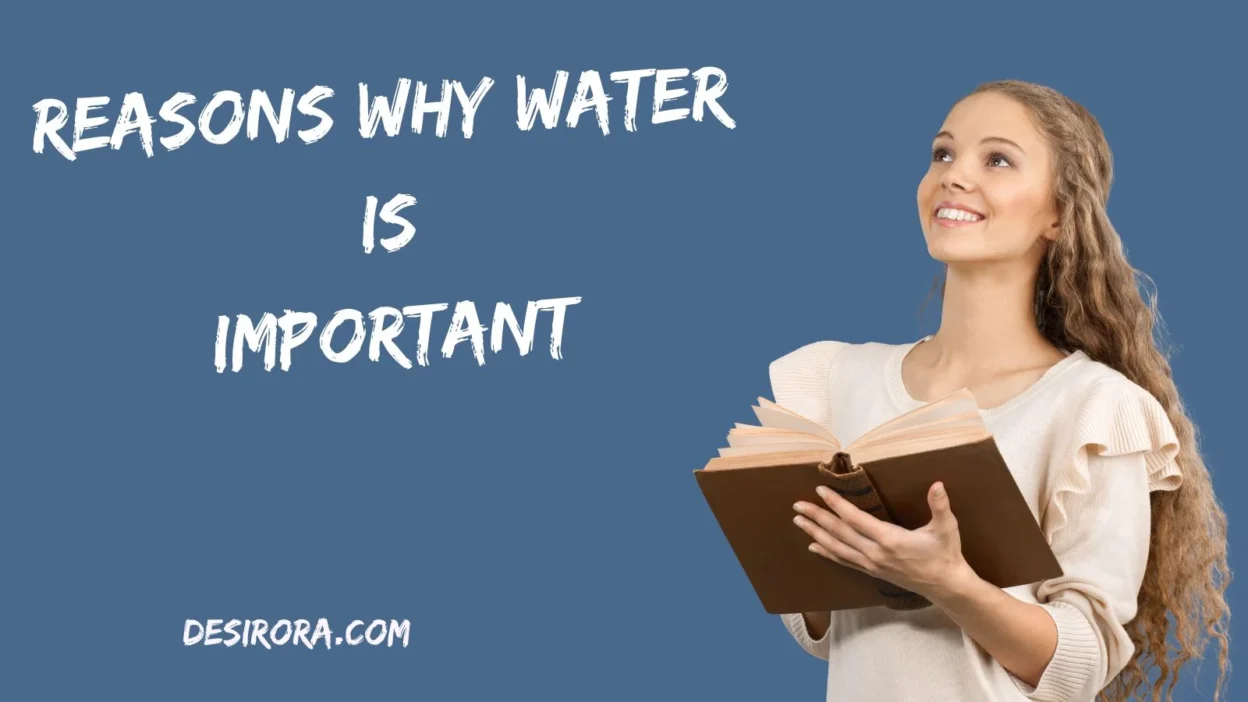Water is life — quite literally. Every living thing on Earth, from the tiniest seed to the tallest human, depends on water to survive, grow, and thrive. Yet, because it’s so easily available (for many of us), we often take it for granted. Think about it — you can go days without food, but not even a few days without water.
Our bodies, our environment, and even our emotions are deeply connected to this simple, clear liquid. It fuels every heartbeat, cushions every joint, and even influences how we think and feel. Whether it’s the morning glass that wakes you up or the cool sip that revives you after a workout, water is the unsung hero behind nearly every function that keeps us alive.
In this article, we’ll dive deep into the real reasons why water is important — not just for health, but for performance, beauty, focus, and overall well-being. You’ll see how this basic element plays extraordinary roles in your life, often in ways you never realized before.
Why Our Bodies Need Water
Let’s get straight to the heart of the matter: water is fundamental to life. When you look at a glass of water, you might just see something cool and clear—yet inside your body, water is doing heavy-duty work.
Think of your body as a finely tuned machine. Every gear, belt and pulley needs lubricant to keep moving. Water is that lubricant. It flows through your bloodstream, brings nutrients to cells, removes waste, and helps maintain body temperature.
What happens when you skip water
- You feel tired or sluggish—your body struggles to perform.
- You might get headaches; even mild dehydration can pinch brain function.
- Your muscles tighten, your skin looks dull, your digestion slows.
Your body is about 60% water (in adults). When that percentage drops, it sets off a cascade of effects.
Keeping it topped up helps you live better and feel stronger.
The Role of Hydration in Health and Wellness
This is more than “drink eight glasses a day.” It’s about giving yourself the foundation for good health.
Key benefits:
- Temperature regulation: When you’re hot, your body sweats, and water helps evaporate that sweat to cool you down.
- Joint lubrication: Cartilage, mostly water, keeps joints moving smoothly. One less sip = one more creak.
- Kidney function: Your kidneys use water to flush out toxins. Without enough, waste builds up.
- Blood volume and circulation: Water ensures your blood stays fluid, delivering oxygen and nutrients efficiently.
Real-life example
Imagine you’re out for a walk, midday sun, no water bottle in hand. Your heart rate climbs, you get dizzy, you stop.
Now imagine you’re sipping water regularly—your body copes, you keep going.
Same person, different outcome—all because hydration was in or out.
Wellness tip
Keep a reusable water bottle nearby. Make it your companion. Whenever you glance at it, you’re reminded: hydrate now, feel better later.
Water’s Impact on Physical Performance
Athletes know it. Weekend runners and gym-goers should know it, too. Your muscles, your energy, your endurance—they all rely on water.
What happens during exercise
- You sweat, losing water and electrolytes.
- Your blood gets thicker, the heart works harder.
- You may cramp, tire out faster, recover slowly.
Tips for staying hydrated during activity
- Drink water before, during, and after the workout.
- Consider electrolyte-rich water or isotonic drinks if you’re sweating heavily.
- Another practical tip: weigh yourself before and after exercise. Loss of more than 1–2 % body weight? You’re likely under-hydrated.
Example scenario
Sarah runs marathons. She carries a 500 ml bottle every 10 km, takes small sips regularly. Her friend Mike skips water until halfway. Sarah finishes strong. Mike finishes late and sore.
It’s not just the miles—it’s the water.
How Water Supports Cognitive Function
Your brain is roughly 75% water. That’s not a coincidence. To think clearly, respond quickly, regulate mood—your brain needs fluid.
Cognitive benefits of hydration
- Better concentration and focus
- Fewer brain-fog moments
- Reduced irritability and mood swings
- Quicker reaction times
Everyday example
At work, you’re shifting between tasks. If you’re low on water:
- You misplace files.
- You read the same line twice.
- You feel cranky at lunch for no clear reason.
But after a glass of water? You snap back. You think clearly. You push through.
Practical quick fix
Keep a 300–ml glass on your desk. Every time you stand up—for the printer, the washroom—take a sip. It adds up fast.
Water and Digestion: Making It Work Smoothly
Your body’s digestive system is something like a factory—raw materials go in; processed nutrients and waste come out. Water keeps that factory running.
How water helps digestion
- It dissolves nutrients so they can be absorbed.
- It helps move food smoothly through the intestines, preventing constipation.
- It supports digestive juices and saliva production.
Example
After a heavy meal, you might feel slow and bloated. A glass of water helps ease that feeling—food moves along, your gut relaxes, you feel lighter.
Tip
Try drinking a small glass of water 15 minutes before your meal. It helps prime digestion—without the “full but stretched” feeling.
How Hydration Affects Skin, Hair and Beauty
Ever had that “ocean glow” look? Part of it comes from good hydration. Your skin and hair reflect what’s going on inside. Water is key.
Beauty-related benefits
- Skin appears plumper and more radiant
- Fewer fine lines as cells stay hydrated
- Hair gets more sheen and less breakage
- Nails may get healthier too
Real-life example
Lisa swapped her afternoon coffee for a tall glass of water with lemon. Within weeks, her skin looked brighter, pores looked smaller, and she got compliments.
Water didn’t replace her skincare—it supported it.
Tip
For a beauty boost: Drink one glass right after waking up. Your body’s been without fluid for hours—jump-start it. Then carry on through the day.
Types of Water and Their Uses
Water comes in various types and styles. Not all “water” is the same in taste, content or purpose. Here’s a quick guide.
| Type of Water | Description | Best For |
| Tap Water | Provided by municipal supply | Everyday use (drinking, cooking) |
| Filtered or Purified Water | Tap water + filtration (charcoal, reverse-osmosis, etc) | Cleaner taste, fewer contaminants |
| Mineral or Spring Water | Naturally occurring underground water | Taste, minerals, premium drinking |
| Distilled Water | Purified to vapor, then condensed | Appliances (steam irons), not ideal as sole drinking water maybe |
| Alkaline Water | Higher pH level | Controversial benefits, taste preference |
| Sparkling Water | Carbonated water | Refreshing alternative to soda |
Quick tip
Choose filtered water for everyday hydration—cost-effective and clean. For special occasions or taste preference, mineral or spring water is nice.
Frequently Overlooked Ways Water Helps
Often we think of water simply as “drinking water.” But its benefits stretch further.
- Mood regulation: Even small dehydration can affect your mood. Studies show people feel more anxious and tense when fluid-intake drops.
- Headache prevention: Many headaches result from mild dehydration. Try water first before painkillers.
- Temperature extremes: In heat, water cools you; in cold, it helps your body regulate and keep warm.
- Weight management: Drinking water can fill you up, reduce calorie intake (especially if you swap soda or sweet drinks).
- Immune support: While water isn’t a cure, it helps your immune system by moving lymph fluid and delivering nutrients.
- Habit formation: Drinking water can serve as a mini checkpoint—whenever you refill your bottle, pause, breathe, reset. It becomes a micro-reset habit.
Idioms, Everyday Usage & Real-Life Examples
Water shows up in language and daily life in expressive ways. Here are some idioms and how they relate:
- “Still waters run deep.” Meaning: quiet people often have rich inner lives.
- “Blood is thicker than water.” Family bonds matter more than friendships.
- “Pour cold water on something.” To discourage or dampen enthusiasm.
- “In hot water.” To be in trouble.
- “Water under the bridge.” Past issues you’ve let go of.
Real-life usage:
“I had a big presentation today—I was in hot water when my slides crashed, but drinking some water helped me calm down and keep going.”
These phrases remind us how water is intertwined with life—not just a drink, but a metaphor, a feeling, a tool.
Synonym Table: Talking About “Water” and “Hydration”
When writing or speaking, varying your language prevents repetition and keeps things interesting. Here’s a handy table of synonyms and related terms:
| Primary Term | Synonyms / Alternatives |
| Water | H₂O, liquid refreshment, aqua, the clear drink |
| Hydrate / Hydration | Moisten, water-intake, fluid balance |
| Drink water | Sip water, stay refreshed, consume fluid |
| Dehydration | Fluid loss, under-hydration |
| Body fluids | Intracellular fluid, extracellular fluid, plasma |
Grammar and Style Note: Active Voice, Personal Pronouns, and More
You asked for a friendly, human tone—so here’s how I stay true to that:
- Active voice: “You drink water” not “Water is drunk by you.”
- Personal pronouns: “You,” “we,” “I” where appropriate to speak directly to you.
- Varied sentence lengths: Some short for impact. Some longer to explain.
- Avoid fluff & repetition: Each sentence gives value. No “As we all know” or “It goes without saying.”
- Easy to read: Simple words, clear structure, headings, lists.
- Synonym diversity: As shown in the table above, to keep things lively.
FAQs
Q1: How much water should I drink every day?
It depends on your size, activity level, climate and health. A common guideline is about 2 to 3 litres (or about 8-12 cups) per day for adults. But listen to your body. If you’re very active or in a hot climate, you’ll need more.
Q2: Can I get enough hydration from other drinks like coffee or soda?
While coffee and soda contain water, they often include caffeine or sugar, which can offset hydration benefits. Water remains the best and simplest choice.
Q3: Does drinking cold water vs warm water make a difference?
Not significantly for most people. Cold water may feel more refreshing during exercise; warm water may soothe the stomach. The main thing is you drink enough.
Q4: What are signs of mild dehydration?
Dry lips, dark yellow urine, feeling tired or lightheaded, dry skin, headaches, reduced urine volume. If you notice these, drink water.
Q5: Is it possible to drink too much water?
Yes — rare but possible. It’s called water intoxication (hyponatremia) and happens when you flush out too many electrolytes by drinking massive amounts quickly. But for most people, this isn’t a concern; focus on regular, moderate intake.
Conclusion
In short: the reasons why water is important are many and meaningful. From powering your metabolism and brain to keeping your skin smooth, joints flexible and digestion smooth—water is the silent hero.
Drinking water doesn’t require a special gadget or complex routine. It fits into your life easily: keep a bottle, drink when you feel thirsty, take a sip before a meal, hydrate around workouts.
Remember: when you treat water as a non-negotiable—like breathing—you’re giving your body the environment it needs to thrive. It’s not a remedy for everything, but it is one of the simplest and most effective tools in your health toolbox.




